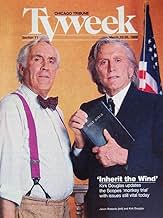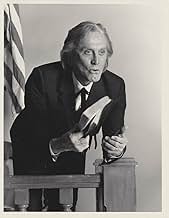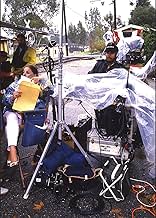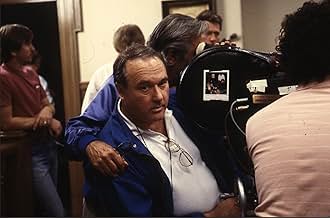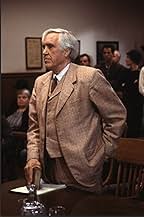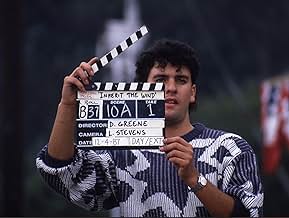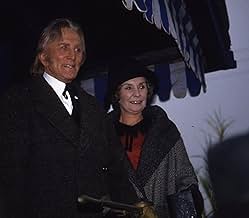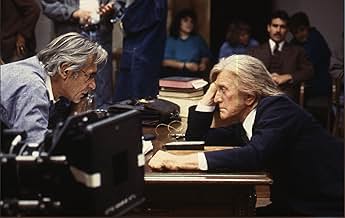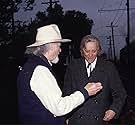अपनी भाषा में प्लॉट जोड़ेंA biblical orator opposes a liberal lawyer defending a man for teaching Darwinism in the 1920s South.A biblical orator opposes a liberal lawyer defending a man for teaching Darwinism in the 1920s South.A biblical orator opposes a liberal lawyer defending a man for teaching Darwinism in the 1920s South.
- निर्देशक
- लेखक
- स्टार
- 2 प्राइमटाइम एमी जीते
- 2 जीत और कुल 1 नामांकन
Tom McCleister
- Bailiff
- (as Thom McCleister)
Richard Gilbert-Hill
- Radio Newsman
- (as Richard Gilbert Hill)
फ़ीचर्ड समीक्षाएं
This made for TV film version of the famous Lawrence and Lee Broadway success is a very enjoyable presentation, and captures two splendid veteran actors doing exceptional work in the twilight of their careers. During the years since its original theatrical release, there have been two more made for TV film versions of Inherit the Wind (IW). Each of the four performances has champions and critics. All of them are interesting and worth seeing. None is dull and to be avoided. That in itself is rather remarkable. The four versions are:
(1) 1960 theatrical film starring Fredric March and Spencer Tracy.
(2) 1965 made for TV film starring Ed Begley and Melvyn Douglas.
(3) 1988 made for TV film starring Kirk Douglas and Jason Robards.
(4) 1999 made for TV film starring George C. Scott and Jack Lemmon.
Something very interesting happens when these four versions are considered as one body of work. Let me explain. For simplicity, I'll refer to each version by its indicated number.
Item: Three of the eight actors who played leading roles in the four versions of IW also played the identical leading roles in either a theatrical or TV film version of Dr. Jekyll and Mr. Hyde. They are Fredric March (1), Spencer Tracy (1) and Kirk Douglas (3).
Item: Two actors who had principal roles in one version of IW also appeared in Days of Wine and Roses. The man starred in the theatrical movie version, and the woman originated the female leading role in the earlier TV version. They are Jack Lemmon (4) and Piper Laurie (4).
Item: Two actors who had principal roles in one version of IW also appeared as co-stars in the film Spartacus. They are Kirk Douglas (3) and Jean Simmons (3).
Item: Two actors who had principal roles in one version of IW also appeared as co-stars in the film The Hustler. They are George C. Scott (4) and Piper Laurie (4).
Item: Two actors who had principal roles in two different versions of IW also appeared as co-stars in the film The Hustler. They are George C. Scott (4) and Murray Hamilton (2).
Coincidence? Of course. But interesting? You bet!
(1) 1960 theatrical film starring Fredric March and Spencer Tracy.
(2) 1965 made for TV film starring Ed Begley and Melvyn Douglas.
(3) 1988 made for TV film starring Kirk Douglas and Jason Robards.
(4) 1999 made for TV film starring George C. Scott and Jack Lemmon.
Something very interesting happens when these four versions are considered as one body of work. Let me explain. For simplicity, I'll refer to each version by its indicated number.
Item: Three of the eight actors who played leading roles in the four versions of IW also played the identical leading roles in either a theatrical or TV film version of Dr. Jekyll and Mr. Hyde. They are Fredric March (1), Spencer Tracy (1) and Kirk Douglas (3).
Item: Two actors who had principal roles in one version of IW also appeared in Days of Wine and Roses. The man starred in the theatrical movie version, and the woman originated the female leading role in the earlier TV version. They are Jack Lemmon (4) and Piper Laurie (4).
Item: Two actors who had principal roles in one version of IW also appeared as co-stars in the film Spartacus. They are Kirk Douglas (3) and Jean Simmons (3).
Item: Two actors who had principal roles in one version of IW also appeared as co-stars in the film The Hustler. They are George C. Scott (4) and Piper Laurie (4).
Item: Two actors who had principal roles in two different versions of IW also appeared as co-stars in the film The Hustler. They are George C. Scott (4) and Murray Hamilton (2).
Coincidence? Of course. But interesting? You bet!
I consider this the most entertaining of the three versions. Though I am a bigger fan of George C. Scott than of Kirk Douglas, I think that Douglas, supported consummately by Jason Robards, makes a far better Matthew Brady. I do like the original play, but I find that fidelity to an old original in many cases does not work well in making an entertaining movie. Now I hope someone will make a movie of the Intelligent-Design case in Pennsylvania recently. Inherit the Wind is based only very loosely on the actual Scopes Trial, which was "set up" as a test case by the ACLU (to which I gladly belong, nonetheless); the Pennsylvania case appears to have been a genuine spontaneous phenomenon, complete with elements of deceit, comedy, and sex!
Not nearly as good as the 1960 original. Jason Robards performance as Henry Drummond stands out clearly as the highlight of the picture. If your going to watch this version include Stanley Kramers 1960 classic and make it a double feature.
This 1988 version of INHERIT THE WIND tried a slightly different approach to the story than the film or the 1965 versions. Apparently there was a deeper delving into the historical material (and - unlike the period of the film and the first dramatic version on television - the resurgence of anti - evolutionary voters in the country) to make the story fairer.
Jason Robards played Drummond/Darrow very well - in the tradition of Muni, Tracy, and Melvyn Douglas. But it was the performance of Kirk Douglas as Brady/Bryan that was unique. As I have mentioned elsewhere in these reviews, Bryan did have valid reasons to dislike Darwinism aside from religious feelings. The issue of Social Darwinism, created by an English elitist snob named Herbert Spencer, had been grabbed by various people in power positions in big business and politics that suggested that the best people were the top of the evolutionary tree - and that big business had the right to destroy small competitors due to "survival of the fittest". Bryan hated this idea, as opposite to Jeffersonian Democracy. He actually intended, after his own humiliation on the witness stand by Darrow to put Darrow on the stand to explain his acceptance of Social Darwinism. Judge Raulston, the trial judge, refused to allow this.
If that had been brought out in this production, it would have set it apart and given a more balanced view of the two parties who clashed in Dayton. Instead, Douglas played Brady like a revivalist (similar to Begley, without Begley's physical resemblance to Bryan). But he also kept trying to keep up the friendly feelings that Darrow and Bryan had when both were fighting on the same side on political issues from 1893 to 1908. While all the productions include those moments of nostalgia between them, this attempted to suggest that Douglas/Brady hoped to "save" the soul of Robards/Drummond. It was a curious idea, but it just did not seem realistic (given their diametrically opposite views on evolution and the Tennessee law). I give this a 7 for the production but the approach was a misfire.
Jason Robards played Drummond/Darrow very well - in the tradition of Muni, Tracy, and Melvyn Douglas. But it was the performance of Kirk Douglas as Brady/Bryan that was unique. As I have mentioned elsewhere in these reviews, Bryan did have valid reasons to dislike Darwinism aside from religious feelings. The issue of Social Darwinism, created by an English elitist snob named Herbert Spencer, had been grabbed by various people in power positions in big business and politics that suggested that the best people were the top of the evolutionary tree - and that big business had the right to destroy small competitors due to "survival of the fittest". Bryan hated this idea, as opposite to Jeffersonian Democracy. He actually intended, after his own humiliation on the witness stand by Darrow to put Darrow on the stand to explain his acceptance of Social Darwinism. Judge Raulston, the trial judge, refused to allow this.
If that had been brought out in this production, it would have set it apart and given a more balanced view of the two parties who clashed in Dayton. Instead, Douglas played Brady like a revivalist (similar to Begley, without Begley's physical resemblance to Bryan). But he also kept trying to keep up the friendly feelings that Darrow and Bryan had when both were fighting on the same side on political issues from 1893 to 1908. While all the productions include those moments of nostalgia between them, this attempted to suggest that Douglas/Brady hoped to "save" the soul of Robards/Drummond. It was a curious idea, but it just did not seem realistic (given their diametrically opposite views on evolution and the Tennessee law). I give this a 7 for the production but the approach was a misfire.
I loved the original Inherit the Wind. Fredric March gave one of the best film performances of all time, as the evangelical lawyer Matthew Harrison Brady in 1960. I knew going into it that the remake probably wouldn't be as good as the original, but I wanted to give it a chance, for Kirk Douglas's sake. He tried very hard, and had he not been following Fredric March, he would have given a great performance. But if you've seen the original, no one else can play Matthew Harrison Brady.
In case you haven't seen the original, the story is an adapted version of the famous Scopes Monkey trial in the 1920s. A teacher in America's Deep South, teaches his students about Charles Darwin, and he's arrested. The majority of the film takes place in the courtroom, as two legendary lawyers battle the issue. So, if you don't like one of the two lead actors, it will greatly affect your enjoyment of the film. I'm not a Spencer Tracy fan, but with Jason Robards taking his place in the remake, I began to appreciate Spence's performance better. I know there are some people out there who are Jason Robards fans, but I'm not one of them. He's just not likable, and he always seems tired, bored, slightly angry, and wishing he was anywhere but on a film set.
If you really like Kirk Douglas, you'll probably want to see this movie, but it's not nearly as good as the original. Jean Simmons plays Kirk's wife, and even though she gives a good performance, there was nothing really wrong with her predecessor, Florence Eldridge. Watch the original, and if you really enjoy the story and like Kirk Douglas, then you can rent this one.
In case you haven't seen the original, the story is an adapted version of the famous Scopes Monkey trial in the 1920s. A teacher in America's Deep South, teaches his students about Charles Darwin, and he's arrested. The majority of the film takes place in the courtroom, as two legendary lawyers battle the issue. So, if you don't like one of the two lead actors, it will greatly affect your enjoyment of the film. I'm not a Spencer Tracy fan, but with Jason Robards taking his place in the remake, I began to appreciate Spence's performance better. I know there are some people out there who are Jason Robards fans, but I'm not one of them. He's just not likable, and he always seems tired, bored, slightly angry, and wishing he was anywhere but on a film set.
If you really like Kirk Douglas, you'll probably want to see this movie, but it's not nearly as good as the original. Jean Simmons plays Kirk's wife, and even though she gives a good performance, there was nothing really wrong with her predecessor, Florence Eldridge. Watch the original, and if you really enjoy the story and like Kirk Douglas, then you can rent this one.
क्या आपको पता है
- ट्रिवियाThe real William Jennings Bryan ran for President three times: 1896, 1900, and 1908. Bryan was the first Presidential candidate to extensively barnstorm during a Presidential campaign in an era when most candidates did not. Although it's suggested that he might be contemplating a run in the next election, which would have been in 1928, it's highly unlikely. He did serve in public office twice - as Congressman from Nebraska from 1891 to 1895 and as Secretary of State under Woodrow Wilson from 1913 to 1915, when he resigned over the country's policy toward Germany after the Lusitania was sunk. Despite his fundamentalist Christian beliefs, he was considered as Liberal and Progressive, supporting anti-Imperialist policies and trust-busting.
- गूफ़In several courtroom scenes when the focus is on Bertram Cates, the actor, Kyle Secor, wears glasses in which you can see the reflection of the production lights as well as white flags used by the production staff to mute the lights. In the 1930s, courtrooms would have utilized electric lights with a milk glass lamp shade known as a "schoolhouse light".
- भाव
Rachel Brown: I don't understand it, and what I do understand I don't like. I don't believe I came from apes and monkeys. You see, I really haven't thought very much. I was always afraid of what I might think. It seemed safer not to think at all. Maybe - maybe what Mr. Darwin wrote is bad. Bad or good I think ideas have to come out. I think they should be heard. I don't think they ought to pass laws against them.
- कनेक्शनFeatured in The 40th Annual Primetime Emmy Awards (1988)
टॉप पसंद
रेटिंग देने के लिए साइन-इन करें और वैयक्तिकृत सुझावों के लिए वॉचलिस्ट करें
विवरण
- रिलीज़ की तारीख़
- कंट्री ऑफ़ ओरिजिन
- भाषा
- इस रूप में भी जाना जाता है
- Der Brady-Skandal
- फ़िल्माने की जगहें
- उत्पादन कंपनियां
- IMDbPro पर और कंपनी क्रेडिट देखें
इस पेज में योगदान दें
किसी बदलाव का सुझाव दें या अनुपलब्ध कॉन्टेंट जोड़ें


